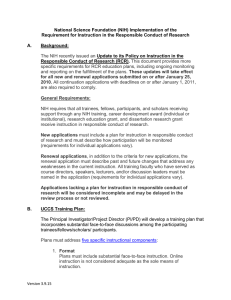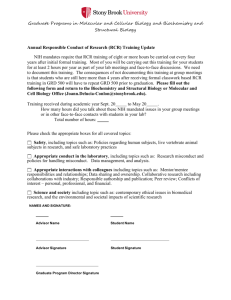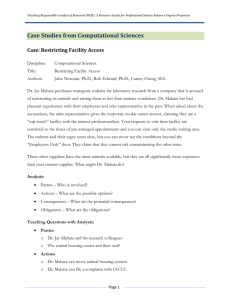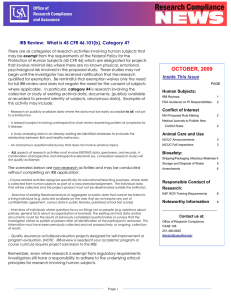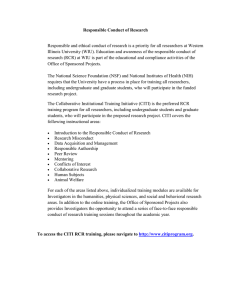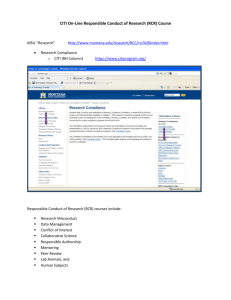Educational Video Available on Use of Biological Specimens
advertisement
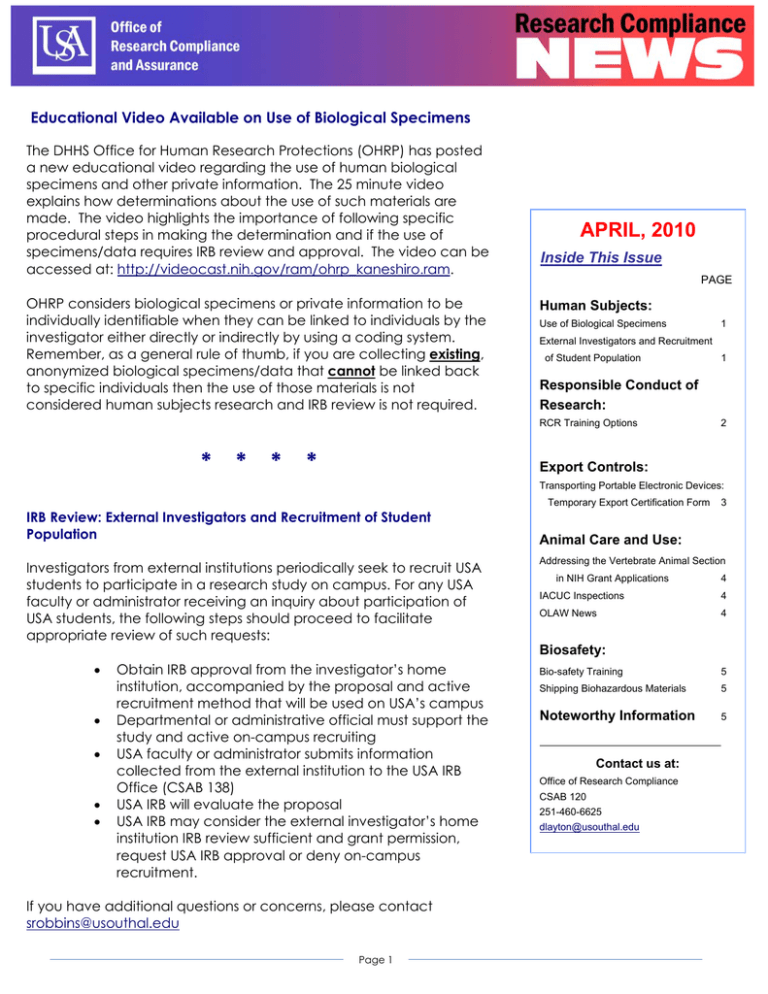
Educational Video Available on Use of Biological Specimens The DHHS Office for Human Research Protections (OHRP) has posted a new educational video regarding the use of human biological specimens and other private information. The 25 minute video explains how determinations about the use of such materials are made. The video highlights the importance of following specific procedural steps in making the determination and if the use of specimens/data requires IRB review and approval. The video can be accessed at: http://videocast.nih.gov/ram/ohrp_kaneshiro.ram. OHRP considers biological specimens or private information to be individually identifiable when they can be linked to individuals by the investigator either directly or indirectly by using a coding system. Remember, as a general rule of thumb, if you are collecting existing, anonymized biological specimens/data that cannot be linked back to specific individuals then the use of those materials is not considered human subjects research and IRB review is not required. APRIL, 2010 Inside This Issue PAGE Human Subjects: Use of Biological Specimens of Student Population * * * 1 Responsible Conduct of Research: RCR Training Options * 1 External Investigators and Recruitment 2 Export Controls: Transporting Portable Electronic Devices: IRB Review: External Investigators and Recruitment of Student Population Investigators from external institutions periodically seek to recruit USA students to participate in a research study on campus. For any USA faculty or administrator receiving an inquiry about participation of USA students, the following steps should proceed to facilitate appropriate review of such requests: Temporary Export Certification Form 3 Animal Care and Use: Addressing the Vertebrate Animal Section in NIH Grant Applications 4 IACUC Inspections 4 OLAW News 4 Biosafety: Obtain IRB approval from the investigator’s home institution, accompanied by the proposal and active recruitment method that will be used on USA’s campus Departmental or administrative official must support the study and active on-campus recruiting USA faculty or administrator submits information collected from the external institution to the USA IRB Office (CSAB 138) USA IRB will evaluate the proposal USA IRB may consider the external investigator’s home institution IRB review sufficient and grant permission, request USA IRB approval or deny on-campus recruitment. If you have additional questions or concerns, please contact srobbins@usouthal.edu Page 1 Bio-safety Training 5 Shipping Biohazardous Materials 5 Noteworthy Information 5 Contact us at: Office of Research Compliance CSAB 120 251-460-6625 dlayton@usouthal.edu RCR Training Options… It is likely that you have received various communications about new regulatory mandates and institutional guidelines regarding training in the Responsible Conduct of Research (RCR). The rules can be confusing to interpret who needs what and how to meet compliance. A reminder, if you have a student conducting research then University Policy requires they complete RCR training. In most cases this can be conducted through an online training module from the Collaborative Institute Training Initiative (CITI) hosted by University of Miami available at: https://www.citiprogram.org/ . There are other options available such as completion of an approved graduate course outlined in the institutional RCR training plan for Students and Postdoctoral Fellows. Additionally, supplemental training is required for designated summer research programs and postdoctoral fellows. Do you have funding from the National Science Foundation? If so, the University’s policy as referenced above complies with NSF’s mandate for RCR training. Keep in mind that NSF requires the institution to track and validate compliance with the NSF RCR training requirement. Therefore the Office of Research Compliance and Assurance conducts a review 3 months after NSF award initiation and then on a successive, yearly basis to verify that all NSF-funded research personnel have documented completion of RCR training. This process involves asking for names of research personnel assigned to the grant and status/documentation of RCR training. Follow-up information is necessary, even if you haven’t currently hired any research personnel. Lastly, the National Institutes of Health has updated its RCR instruction requirements for specific, limited grant awards. One of the major differences with the new NIH RCR mandate is that some component must include face to face interaction, which may be supplemented by online instructional training. RCR training for NIH designated grant awards should include a plan that has been tailored to meet the specific needs of the trainees in that program. The Office of Research Compliance has developed a RCR Training Workshop guidance document to aid investigators in their plan development. RESEARCH MISCONDUCT Interactive training sessions for postdoctoral fellows Presented by: Russ Lea, Ph.D., VP for Research are available by registering for the “RCR Pathway to SESSIONS: Thursday, June 3rd 9:00-10:30 am - OR Independence” series offered each spring Tuesday, June 22nd 2:00-3:30 pm semester. Additionally, faculty is encouraged to attend periodic scheduled RCR campus wide WHERE: College of Medicine Conference Room educational sessions. A certificate of completion or (adjacent from Biomedical Library) attendance will be issued for record keeping purposes. Details can be found on this topic at: To register go to https://jagmail.usouthal.edu/cgi- http://www.southalabama.edu/researchcompliance/responsible.html bin/CA/seminar/semrca.cgi Please contact the Office of Research Compliance for additional questions: ahenry@usouthal.edu or dlayton@usouthal.edu Page 2 ing out of ll e v a r t m a I nd taking a y r t n u o c the d l lap top an a n o s r e p y m , is there e n o h p t r a sm need to do? any thing I Honestly, no. The US government allows for the temporary export of your personal electronic items as long as you plan to return with in a year. BUT! WHERE ARE YOU GOING? IS YOUR RESEARCH DATA ON THE DEVICE? DOES YOUR COMPUTER HAVE CUSTOM SOFTWARE? IS YOUR OPERATIONG SYSTEM NEWER THAN WINDOWS 2000???? These are some things that could affect your return through customs on the way home. Make things a little easier and fill out the TMP form included in the International Travel Review Form and take it with you! It just says that you agree to keep the device within your effective control, that you promise to bring it home to be serviced, and that you didn’t take it to certain places. http://www.southalabama.edu/travel/international.html Questions? ahenry@usouthal.edu Page 3 Animal Care and Use….. Addressing the Vertebrate Animal Section in Your NIH Proposal The NIH issued on April 19th, “Instructions for Completion and Technical Evaluation of the Vertebrate Animal Section (VAS) in NIH Contract Proposals” available at: http://grants.nih.gov/grants/guide/notice-files/NOT-OD-10049.html The purpose of the Notice is to clarify the information that must be included in the VAS of grant applications. It also explains how the VAS is evaluated as part of the NIH peer review process and is considered as part of the overall scoring. The Office of Research Compliance and the Department of Comparative Medicine are currently developing guidelines to aid Investigator’s in addressing the five elements as outlined by NIH. The Principal Investigator is responsible for ensuring that the VAS provided in the grant application is consistent with corresponding IACUC protocol(s) submitted for the IACUC’s review and approval. The Public Health Service (PHS) Policy on the Humane Care and Use of Laboratory Animals indicates that institutions receiving PHS awards for projects involving live vertebrate animals require that the IACUC approved protocol be congruent with the grant application. Preparation for IACUC Inspections The IACUC is preparing to conduct the Semi-annual inspection in May. A subcommittee of two or three IACUC members will inspect all areas where animals are housed for longer than 12 hours, as well as areas where procedures on USDA species and surgical manipulation on any species is performed. Please note: The IACUC has approved a change requiring PI’s who perform procedures in the Vivarium to keep a binder in the Department of Comparative Medicine to include a copy of their active protocol, approval letter and all training documentation. NEWS from OLAW: Guidance on Confirming Appropriate Charges to NIH Awards during Periods of Noncompliance, NOT-OD-10081. APHIS posts annual reports and inspection reports for research facilities on their website. Although inspection reports have been available through the Freedom of Information Act , these posts now allow immediate internet connection to view inspection reports. New FAQ’s posted on March 18th and February 26th at: http://grants.nih.gov/grants/olaw/news.htm#20100318 Page 4 Biosafety Training Shipping Bio-hazardous Materials Investigators with a registration approved by the Institutional Bio-safety Committee must complete Bio-safety training once a year. This includes technicians and students working with the approved biohazard in the research lab. The training reviews good laboratory practices and universal precautions along with guidelines of how to work with blood borne pathogens. The link to training can be found at: http://www.southalabama.edu/researchco mpliance/biosafety.html The online training modules for certification in shipping bio-hazardous substances are online at http://www.southalabama.edu/researchco mpliance/biosafety.html . As a reminder, if you are simply shipping biological specimens that are reasonably assumed to be free of disease, you only need to review the Category B shipping procedures. Training modules are free of charge and can be taken at your leisure. Please contact Alison Henry at aheny@usouthal.edu for any concerns or questions. * * * Noteworthy News * * * NIH announces Genetic Testing Registry. Database to Fill Information Gaps and Serve as Research Resource, NIH News, Mar 18, 2010 "The National Institutes of Health announced today that it is creating a public database that researchers, consumers, health care providers, and others can search for information submitted voluntarily by genetic test providers. The Genetic Testing Registry (GTR) aims to enhance access to information about the availability, validity, and usefulness of genetic tests…" Stem cells: One year later, a long way to go, Medill Reports, Mar 3, 2010 "…One year later, while researchers across the country are actively pursuing that funding and available embryonic stem cell lines, some doctors say the hype has misled the public about how soon treatment could become available…" Whistle-Blower Protection a Must, Genetic Engineering and Biotechnology News, Feb 15, 2010 "In November 2008, Suzanne Stratton, Ph.D., was summarily dismissed from her job at the Carle Foundation Hospital in Urbana, IL. The events leading up to her firing, those currently known, paint a chilling picture of rogue research, an institutional culture unwilling to support bedrock bioethical values, and the substantial risks conscientious employees take in blowing the whistle on misconduct in science…" Book Review: A Woman’s Undying Gift to Science, New York Times, Feb 2, 2010 "…Henrietta Lacks, was a poor and largely illiterate Virginia tobacco farmer, the great-great-granddaughter of slaves. Born in 1920, she died from an aggressive cervical cancer at 31, leaving behind five children…To scientists, however, Henrietta Lacks almost immediately became known simply as HeLa (pronounced hee-lah), from the first two letters of her first and last names. Cells from Mrs. Lacks’s cancerous cervix, taken without her knowledge, were the first to grow in culture, becoming “immortal” and changing the face of modern medicine…" Source: Illuminata-Inc. News Newsletter archives are available through the Office of Research Compliance website at: http://www.southalabama.edu/researchcompliance/index.html Page 5
